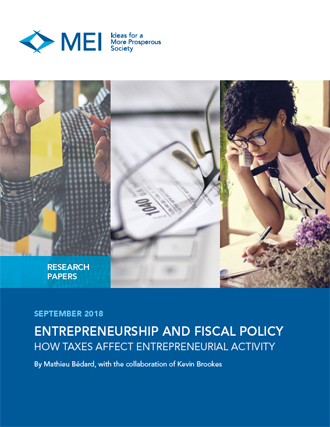High taxes kill entrepreneurship

Montreal, September 13, 2018 – Entrepreneurship is a hot topic, a buzzword that leaves no politician indifferent. However, political decision-makers should bear in mind that entrepreneurship is affected by fiscal policy. When taxes are high, there are fewer entrepreneurs, and fewer businesses are created, which means that less wealth is created. This is the key takeaway from the Research Paper published today by the MEI, entitled Entrepreneurship and Fiscal Policy – How Taxes Affect Entrepreneurial Activity.
“A tax always has the effect of reducing the consumption of a good or service, and the same holds true for entrepreneurship. Taxes influence the incentive to start a business, and an individual’s ability to accumulate the capital needed to go into business for oneself, among other things,” explains Mathieu Bédard, Economist at the MEI and author of the publication.
A study looking at 85 countries found that a 10-percentage-point increase in the corporate tax rate reduces the number of businesses per 100 people by 1.9. Studies also show that high taxes reduce the funding available for business creation.
“When there are fewer entrepreneurs, there is less economic growth and less prosperity to finance government programs. Even those whose concern is to maximize government resources therefore have an interest in not asphyxiating entrepreneurs with disproportionate taxes,” points out Mr. Bédard.
Lower corporate taxes can even lead to higher government revenue. At any rate, it is not the case that tax receipts will necessarily shrink. “This was confirmed in Canada in recent history: Revenues from the federal corporate income tax remained relatively stable between 2001 and 2012, while the corporate tax rate was nearly cut in half. Economic activity therefore clearly increased during this period,” adds the author.
Whether as a result of direct taxation, which reduces the gain of entrepreneurs and the incentive to start a business, or indirectly, through the reduction of the savings needed for start-up capital, the studies surveyed for the Research Paper show that there is less entrepreneurship when taxes are higher.
“The tax level always ends up affecting entrepreneurship, whether we’re talking about individual or corporate taxes. Public policies that favour competition, lower the tax burden, and open up the borders, not to mention a low level of regulation, are effective ways of encouraging our entrepreneurs without raising the burden on taxpayers,” concludes Michel Kelly-Gagnon, President and CEO of the MEI.
The Research Paper entitled Entrepreneurship and Fiscal Policy – How Taxes Affect Entrepreneurial Activity was prepared by Mathieu Bédard, Economist at the MEI, in collaboration with Kevin Brookes, Public Policy Analyst at the MEI. This publication is available on our website.
* * *
The MEI is an independent public policy think tank. Through its publications and media appearances, the MEI stimulates debate on public policies in Quebec and across Canada by proposing reforms based on market principles and entrepreneurship.
-30-
Interview requests: Pascale Déry, Vice President, Communications and Development, MEI. Tel.: 514-273-0969 ext. 2233 / Cell: 514-502-6757 / E-mail: pdery@iedm.org

